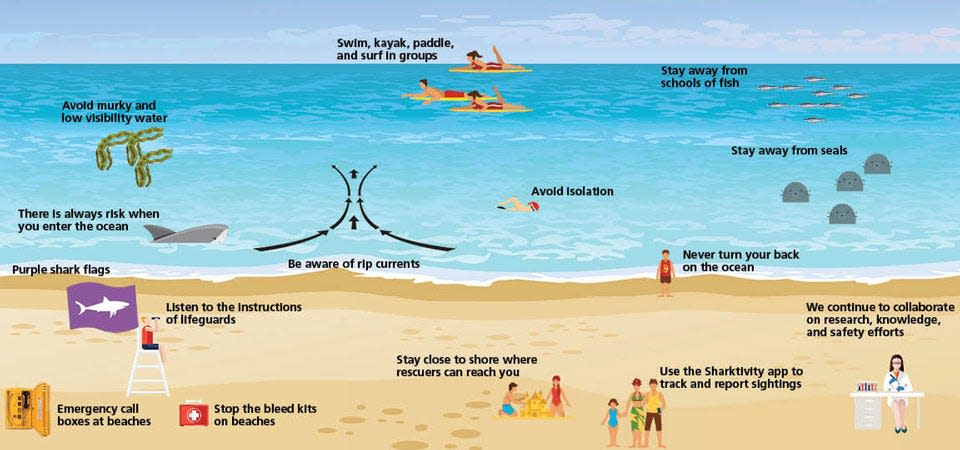'Everyone going into the ocean should exercise caution.' Reduce the risk of a shark attack
With summer in full swim on Cape Cod, the Cape Cod National Seashore has issued a guide on reducing the risk of an unpleasant interlude with a shark.
The Seashore's Shark Smart tips arrived on June 29 and the accompanying press release noted that: "While it is rare for a great white shark to bite a human, since 2012, sharks have bitten people three times in the waters off Truro and Wellfleet. One bite, in 2018, resulted in a fatality."
The September 2018 attack at Newcomb Hollow Beach in Wellfleet claimed the life of bodyboarder Arthur Medici of Revere. In his memory, a group of Cape wave-riders and the nonprofit Cape Cod Ocean Community established the Arthur Medici Memorial Scholarship, which is awarded annually to Nauset Regional High School students.

Swimming is an inherently risky activity and the Seashore's shark tips are all about reducing that risk. According to the press release, "With coastline topography changes and sharks and seals in the ocean, any level of activity in the water, whether wading, swimming, or surfing, will pose a different degree of risk. Everyone going into the ocean should exercise caution and be willing to assume the level of risk associated with their behavior prior to entering the water."
Here are the Cape Cod National Seashore's Shark Smart and beach safety tips for summer 2023:
Be aware sharks hunt for seals in shallow water.
Stay close to shore where rescuers can reach you.
Swim, paddle, kayak and surf in groups. Don’t isolate yourself.
Avoid areas where seals are present.
Avoid areas where schools of fish are visible.
Avoid murky or low-visibility water.
Limit splashing.
Follow all sign and flag warnings at beaches and instructions of the lifeguards.

If you see a shark and a lifeguard is on duty:
Notify a lifeguard if a shark is sighted.
Water will be temporarily closed to recreational activities.
Beach goers will be notified when they can reenter the water.
Beach and ocean safety basics:
Follow all sign and flag warnings at beaches and instructions of the lifeguards.
Never turn your back to the ocean.
Be alert for rip currents, shore break and strong undertows.
If caught in a rip current:
Remain calm to conserve energy, and think clearly.
Don't fight the current. Swim out of the current in a direction parallel to the shoreline.
When out of the current, swim towards the shore.
If you cannot swim out of the current, float or calmly tread water.
If you cannot reach the shore, draw attention to yourself — wave your arms and yell for help.
If you see someone in trouble — get help from a lifeguard. If there is no lifeguard on duty, call 911.
Safety in the sand:
Sand collapses easily; do not climb slopes or dunes since undercut cliffs can collapse at any time without warning.
Deep holes can lead to burial and suffocation; do not dig holes deeper than knee level of the smallest person in your group.
Eric Williams covers news, mainly on the Outer Cape, and writes about a variety of ways to enjoy the Cape, the weather, wildlife and other subjects. Contact him at ewilliams@capecodonline.com. Follow him on Twitter: @capecast
Thanks to our subscribers, who help make this coverage possible. If you are not a subscriber, please consider supporting quality local journalism with a Cape Cod Times subscription. Here are our subscription plans.
This article originally appeared on Cape Cod Times: Sharks and Cape Cod swimmers: How to reduce the risk of an attack

